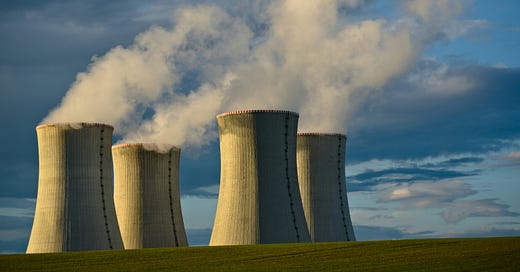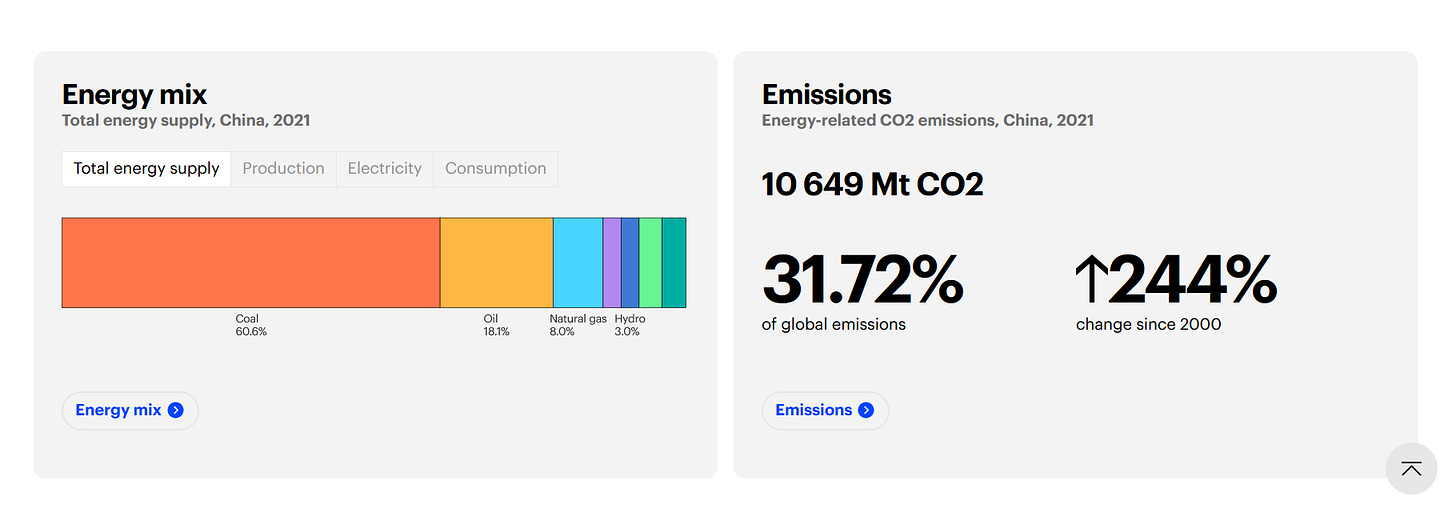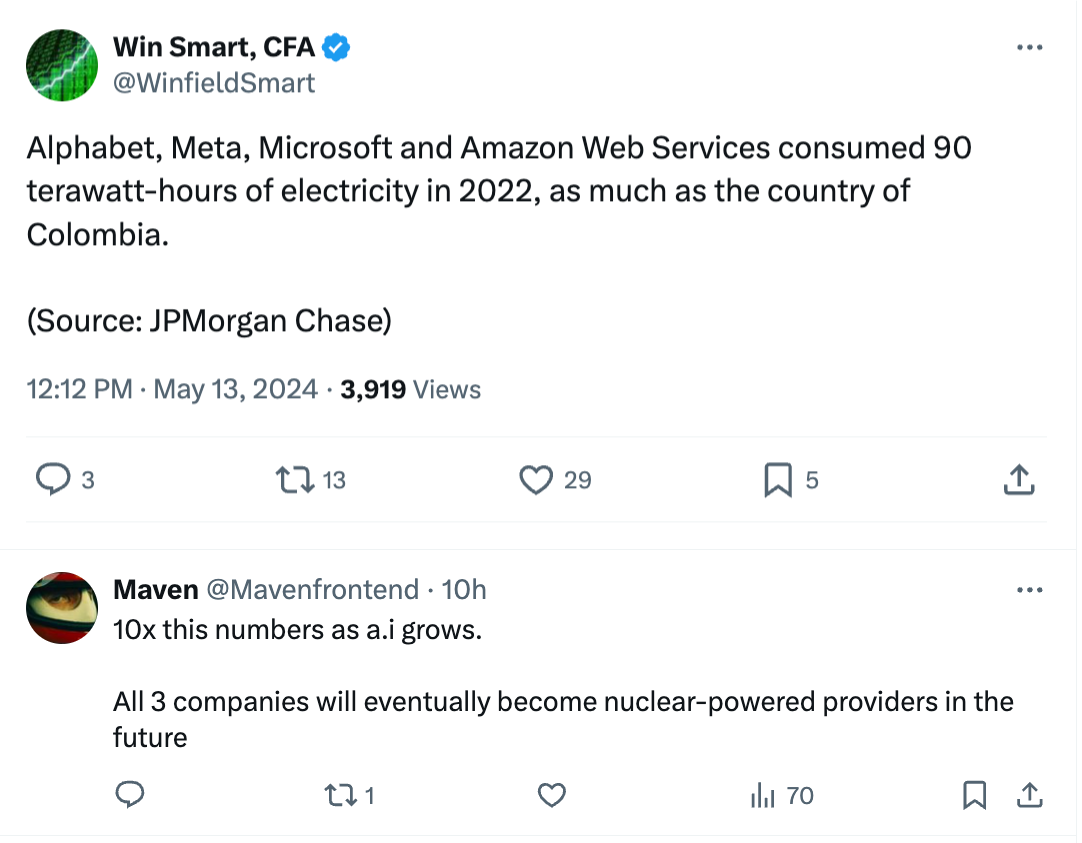The surveillance state will be a power hog
The amount of power required for the data centers that underpin the control grid and AI is overwhelming.
From ChatGPT to autonomous vehicles, the ever-expanding demand for artificial intelligence (AI) and data storage is sending power consumption in the US through the roof. Power consumption for data centers alone is projected to double by 2030, according to commercial property consultant Newmark.
From a recent Wall Street Journal article:
U.S. power usage is projected to expand by 4.7% over the next five years, according to a review of federal fillings by the consulting firm Grid Strategies. That is up from a previous estimate of 2.6%.
The projections come after efficiency gains kept electricity demand roughly flat over the past 15 years, allowing the power sector to limit emissions in large part through coal-plant closures.
“We haven’t seen this in a generation,” said Arne Olson, a senior partner at consulting firm Energy and Environmental Economics. “As an industry, we’ve almost forgotten how to deal with load growth of this magnitude.”
Just over 60 percent of China’s power grid is fueled by coal, according to the International Energy Agency. How else could you transform a country as big and as vast from backwater to tech leader in about 30 years?
But, while China has used every available source of energy in its arsenal, the West has been hell bent on destroying traditional energy generation for use by our remnant industrial base by focusing on wind and solar, which is nowhere near stable enough to maintain baseload for the kinds of important manufacturing activities needed in a modern economy — whether making steel, or appliances, or cars. Instead, we basically handed over our industrial and economic infrastructure to China, seduced by the lax environmental rules, cheap labor and promise of vast profits for shareholders.
That was fine for a while. Today however, it’s become clear that instead of influencing China toward liberty and freedom, the opposite has happened — we’ve become more like China. We are embracing the security and surveillance state, and that desperately requires more power. This is also compounded by the fact that the relationship between the US and China is more adversarial than ever; the fragility of globalized and interconnected economies has shown the thesis that farming out industry and production to other countries is an achillies heel for the US.
There’s only one option to rebuild US (and by extension, the West’s) manufacturing capacity, plus meet self-imposed goals for a clean energy grid, and fuel an exponentially growing need to power massive server farms: nuclear power.
From Substack’s number one energy and economy pundit (and a favorite of Collapse Life), Doomberg, in a recent write-up entitled Prime Time:
Pro-nuclear advocates welcomed an historic announcement last week when Amazon Web Services (AWS), the world’s largest operator of data centers, made a decisive move that all but validated the inevitable:
“One of the US’s largest nuclear power plants will directly power cloud service provider Amazon Web Services’ new data center. Power provider Talen Energy sold its data center campus, Cumulus Data Assets, to Amazon Web Services for $650 million. Amazon will develop an up to 960-megawatt (MW) data center at the Salem Township site in Luzerne County, Pennsylvania.
The 1,200-acre campus is directly powered by an adjacent 2.5 gigawatt (GW) nuclear power station also owned by Talen Energy.
The 1,075-acre Susquehanna Steam Electric Station is the sixth-largest nuclear power plant in the US. It’s been online since 1983 and produces 63 million kilowatt hours per day. The plant has two General Electric boiling water reactors within a Mark II containment building that are licensed through 2042 and 2044.”
Disasters or near-disasters at Three Mile Island, Chernobyl, and more recently Fukushima, managed to take the shine off nuclear power. Environmentalists further demonized nuclear as a clean energy option. Federal, state, and local permitting processes to build a power plant — especially nuclear — are an exercise in administrative torture. But AWS is a very important data storage provider to a vast array of private and governmental entities, and so its acquisition is just the start of how the tables are going to have to turn. It won’t be long before today’s data companies get into the power business, as well.
Expect to see a great many more cooling towers in your vicinity soon, as nuclear power energizes not just the electrical grid, but the control grid, as well. As the appetite for data storage — whether for AI, Central Bank Digital Currency accounts, audio and video capture, autonomous cars, and everything in between dramatically increases, so too will the need for power. All of this begs the question: is the supply chain (uranium and copper supplies are in massive deficit, for example) even capable of making what the Biden administration hopes will be a tripling of nuclear capacity by 2050 happen? Not bloody likely.






Good to bring this energy crisis and the consequences to peoples attention. All new cars contain surveillance software, we are spied and extracted from in many seen and unseen ways. None of this is for our good.
Maybe it's good news that the power grid is faltering as you suggest. As corporations and governments pursue their near-sighted power and control agendas, they fail to see the long term consequences. They don't consider what will happen when pollution peaks, agriculture fails, people starve and are stealthily poisoned, and the biosphere collapses. The great motivator; "profits" will also collapse for some companies as the crisis proliferates, and perhaps then the survivors will realize that humans are intertwined with nature, and can't be above it.